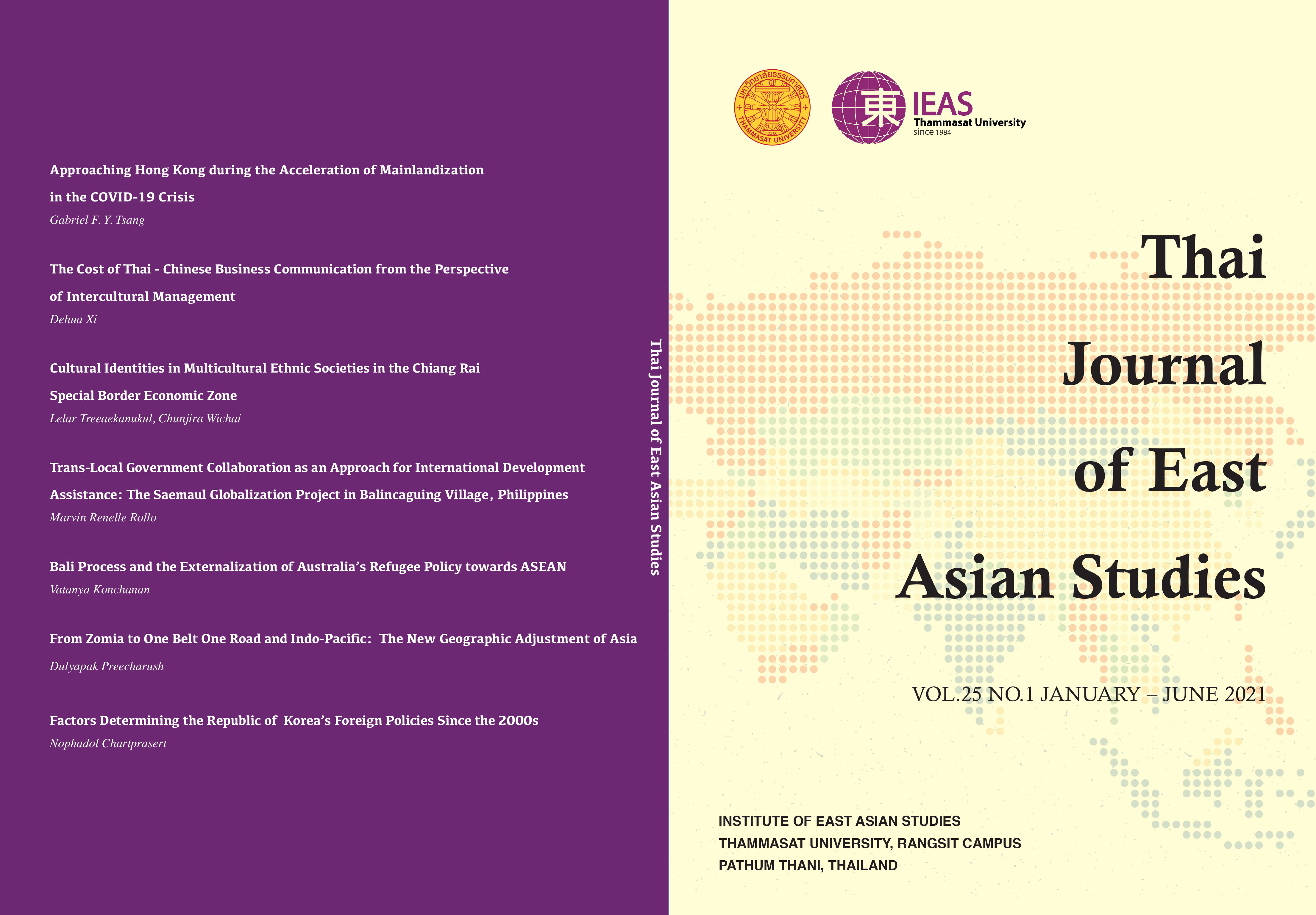ปัจจัยซึ่งมีผลต่อการดำเนินนโยบายต่างประเทศของสาธารณรัฐเกาหลี ตั้งแต่ทศรรษ 2000 ถึงปัจจุบัน
Abstract
นับตั้งแต่ช่วงต้นทศวรรษ 2000 จนถึงปัจจุบันนั้นมีความเปลี่ยนแปลงมากมายเกิดขึ้นในภูมิภาคเอเชียตะวันออกซึ่งมีผลต่อนโยบายต่างประเทศของสาธารณรัฐเกาหลี ถึงแม้ว่าในภาพรวมแล้วนโยบายต่างประเทศของสาธารณรัฐเกาหลียังคงมีความต่อเนื่องมาจากช่วงทศวรรษ 1990 ซึ่งเป็นทศวรรษที่สงครามเย็นเพิ่งสิ้นสุดลง แต่ปัจจัยต่างๆ ทั้งในประเทศและระหว่างประเทศที่เปลี่ยนแปลงไปอย่างรวดเร็วในช่วงสองทศวรรษที่ผ่านมามีผลทำให้มีความเปลี่ยนแปลงหลายประการในการดำเนินนโยบายต่างประเทศของสาธารณรัฐเกาหลี บทความวิจัยนี้มีวัตถุประสงค์ในการศึกษาปัจจัยต่างๆ ทั้งปัจจัยทางภูมิศาสตร์ ปัจจัยทางประวัติศาสตร์ ปัจจัยทางการเมืองภายใน ปัจจัยทางเศรษฐกิจ ปัจจัยทางการทหาร ปัจจัยทางสังคมวัฒนธรรม และปัจจัยซึ่งเกี่ยวกับความก้าวหน้าทางวิชาการและเทคโนโลยีซึ่งมีผลต่อ
การดำเนินนโยบายต่างประเทศของสาธารณรัฐเกาหลีนับตั้งแต่ทศวรรษ 2000 จนถึงปัจจุบัน[1]
[1] บทความวิจัยนี้เป็นผลมาจากงานวิจัยเรื่อง “นโยบายต่างประเทศสาธารณรัฐเกาหลีตั้งแต่ทศวรรษ 2000 จนถึงปัจจุบัน” (พ.ศ. 2564)
Downloads
References
นภดล ชาติประเสริฐ. ปัจจัยซึ่งมีผลต่อการดำเนินนโยบายต่างประเทศของสาธารณรัฐเกาหลี. กรุงเทพฯ: คณะศิลปศาสตร์ มหาวิทยาลัยธรรมศาสตร์, 2538.
นภดล ชาติประเสริฐ. ประวัติศาสตร์ความสัมพันธ์ระหว่างสาธารณรัฐเกาหลีกับญี่ปุ่น ค.ศ. 1965 - 2009. กรุงเทพฯ: คณะศิลปศาสตร์ มหาวิทยาลัยธรรมศาสตร์, 2557.
สุรางค์ศรี ตันเสียงสม. “การเมืองระหว่างประเทศของเกาหลี”. ใน การเมืองระหว่างประเทศในเอเชีย ( หน่วยที่ 11). กรุงเทพฯ: สาขาวิชารัฐศาสตร์ มหาวิทยาลัยสุโขทัยธรรมาธิราช, 2552.
Bridges, Brian. Japan and Korea in the 1990s : From Antagonism to Adjustment. Vermont: Edward Elgar Publishing Company, 1993.
Cho, Myung Hyun. Korea and the Major Powers : An Analysis of Power Structures in East Asia . Seoul : Research Center for Peace and Unification of Korea, 1989”
Faure, Anaïs. “2016: A Pivotal Year for South Korean Diplomacy”, https://thediplomat.com/2016/05/2016-a-pivotal-year-for-south-korean-diplomacy/, สืบค้นเมื่อ January 17, 2021.
Kapitsa, Mikhail, “The Evolving Situation in Northeast Asia and the Korean Problem,” in Korea and World Affairs. (Vol.16 No.3, Fall 1992), pp.495-498.
Kim Jaechun. “South Korea’s Free and Open Indo-Pacific Dilemma”, https://thediplomat.com/2018/05/south-koreas-free-and-open-indo-pacific-dilemma/, สืบค้นเมื่อ January, 17, 2021.
Kim, Ilpyong J., “The Narmalization of Chinese-South Korean Diplomatic Relations,” in Korea and World Affairs (Vol. 16 No. 3, Fall 1992), p.483.
Kim Sung-Mi. “Cursed by Geopolitics? South Korea’s Place in Asia’s Changing Politics of Space” RESEARCH DIVISION ASIA / BCAS 2018 | SESSION NR. 5. https://www.swp-berlin.org/fileadmin/contents/products/projekt_papiere/Kim_BCAS_2018_South_Korea_geopolitics_9_.pdf. สืบค้นเมื่อ January 17, 2021
Krieckhaus, Jonathan. “Geopolitics and South Korea’s Economic Success” Asian Perspective, Volume 41, No.1, January-March 2017.
Lee Chae-Jin. “The direction of South Korea's foreign policy” Korean Studiesม Vol. 2.,1978.
Lee, Chong-Sik, Japan and Korea : The Political Dimension. Standford, California: Hoover Institutional Press, 1985.
Meyer, Peggy Folkenhein, “Gorbachev and Post Gorbachev Policy Toward the Korean Peninsula”, Asian Survey. Vol. XXXII, No. 8 (August 1992), p. 760.
Morrison, Charles E. and Suhrke, Astri. Strategies of Survival: The Foreign Policy Dilemmas of Smaller Asian States. St.Lucia, Queenland: University of Queenland Press, 1987.
Shin, Jung Hyun, “North Korea’s Policy Toward Japan : Perception, Goals, Trends” in The Foreign Relations of North Korea : New Perspectives, edited by Park, Jae Kyu, and others. Colorado : Westview Press, 1987.
Snyder, Scott A., Lee Geun, Kim Young Ho, Kim Jiyoon. Domestic Constraints on South Korean Foreign Policy. Council on Foreign Relations Press: New York. 2018.



